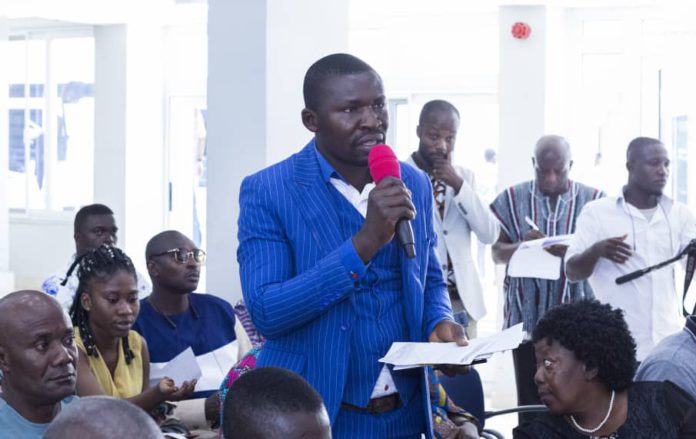The Executive Director of Ghana National Council of Private Schools (GNACOPS), Mr Enoch Kwasi Gyetuah, has disclosed that the introduction of Common Core Program (CCP) as a new curriculum for B7 to B10 level of education is a critical tool that would help to eradicate the growing unemployment situation among young Ghanaian secondary and tertiary school graduates.
Mr Gyetuah made this declaration when addressing the media on Friday, February 28, 2020, after a national stakeholders’ engagement which was held at the Ghana National Association of Teachers hall at Adabraka on the new CCP.
He reiterated that the introduction of the programme is prudent and in the right direction for Ghana’s educational sector taking into account the teaming unemployment situation facing the youth in Ghana after secondary and tertiary education.
He added that the CCP curriculum has some ingredients that focus on hands on activities which also challenge students to be critical thinkers to solve complex situations, thereby creating job opportunities and offering the needed skills that propel employment viability in the global competitive market which is missing in Ghana’s current educational system.
He advised the government and the Ministry of Education to put all positive measures in place to ensure smooth implementation of the programme by involving all stakeholders in any decision making.
Mr Gyetuah also encouraged the Private School Operators in Ghana to put off their old skin of educational delivery methods, and sink into the new wine for better quality assured educational outcomes.
He pledged the private Schools Council’s readiness and support to partner the government in ensuring effective implementation of the CCP.
The stakeholder engagement was at the instance of the National Curriculum and Assessment-NaCCA on the CCP which will start from Basic 7-10. The conference was dubbed, ‘The CCP- Curriculum At a Glance-Using Curriculum to Achieve Better Educational Outcome.’
The CCP is the new programme which is to be introduced in the next academic year in September. The current Basic 6 pupils are going to be the pioneers of the programme. With the CCP which starts from junior high school 1 to Senior High School (SHS) 1, it’s in line with the career path readiness of learners. The learners will combine the already achieved behavioral enhancement which mostly deals with the cognitive aspect with hands on practical training into any chosen discipline.
At SHS 1, all core programmess will end from where learners will pick and learn towards their elective career path course from SHS 2 till they complete school.
The forum was to collate feedback and inputs from key educational stakeholders and partners to help in crafting a very comprehensive CCP.
Speaking at the conference, the acting Executive Secretary of NaCCA, Dr Prince Hamid Armah said that the curriculum seeks to bridge all gaps in the previous syllabus. He added that, the curriculum was designed to help teaching and learning to follow a progressive trend.
According to him, the framework of the CCP would be used to take decisions on remediation, placement, assessment and certification on the learners’ progress. He also hinted on a build-up of a National Assessments Strategy to monitor learners’ performance right from Basic 1 to basic 10 unlike the previous syllabus where major assessment was taken only in basic 9.
He also added that there would be a teacher’s resource pack as well as learner’s resource pack in this new CCP to aid teaching and learning. He encouraged all stakeholders to open up and embrace the new programme which has been developed to cater for the current academic, economic and social needs of the people and particularly on the job market.
On his part, the Director General of the Ghana Education Service, Professor Opoku Amankwaa added that, the government was working at a scheme where they will be installing internet connectivity in the various secondary schools to help in improving teaching and learning. Other key educational stakeholders and partners present were teachers, Teacher Unions, Curriculum Framers, Heads and Principals of Colleges of Education, Educational Consultants, Heads of Basic and Secondary Schools. Present were also Private Schools bodies including Ghana National Council of Private Schools team which was led by the Executive Director Mr Enoch Kwasi Gyetuah and other council members. Also in attendance was the team from Ghana Association of Private schools amongst others as well as students and Curriculum Training Officers.
At the questions and answers segment, all identifiable bodies present got the opportunity to ask questions which were answered by the organisers. There were a lot of contributions, suggestions and other critical inputs made on the day for consideration and possible inclusion into the CCP before the final document.
As his closing remarks, the Chairman of the conference, Professor Dominic Fobi thanked the organisers as well as all the stakeholders for their commitment to seeing to the best of education for the Ghanaian child.
He, however, asked that the engagements should not end till the final document is ready. He prayed NaCCA to still open its doors for contributions and inputs which will only make the CPP better in the end.

